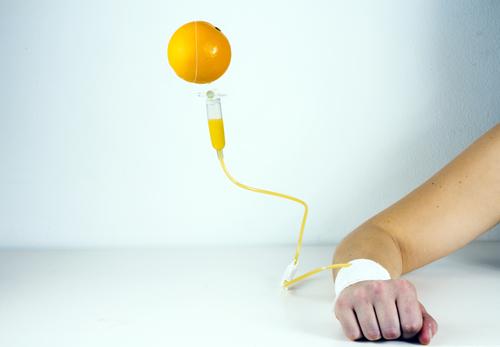OK, so you're not really going to hook up an intravenous (IV) line to an orange to get your infusion of vitamin C — but the picture is worth a thousand words for sure. And some folks are lining up to spend big bucks for IV infusions of all sorts of vitamins, minerals, and other supposed goodies. Why? I'm not really sure, except that over the last few years it seems to have become 'the thing to do' among those who are hyper about their health. All over the country there are so-called 'infusion clinics' that cater to people with a desire to have the latest health treatment, and oh yes, plenty of money.
These treatments have become so popular that an industry has arisen to serve them — infusion clinics. These clinics may or may not have any connection to a health facility, but they are likely to be both chic and comfortable. And the company running such clinics likely offers a variety of products. One that I came across offers a variety of infusions to increase hydration, overcome jet lag, boost energy, etc., etc.
They don't say that they can cure diseases, but other folks do — diseases such as cancer, Parkinson's disease, fibromyalgia, depressions and of course these treatments can "detoxify" you, whatever that means. Such claims aren't particularly new – they've been made for years about regular vitamin supplementation. Back in the 70s, Linus Pauling, who was awarded one Nobel Prize in chemistry and another for his activities to promote peace, somehow became convinced that mega-doses of vitamin C could cure just about everything — cancer in particular. But he never could prove it.
And even now, any inkling that vitamin C can help with cancer is seized upon and promoted. For example, one recent headline blared "High Doses of Vitamin C can help Treat Cancer" — but what the headline doesn't tell you is that the vitamin was given in addition to chemotherapy and radiation, and it extended life somewhat, but didn't cure the victims.
Even if high vitamin doses were the panaceas that some claim, is it really better to have them infused into the bloodstream? For sure, some folks have to take this approach if their gastrointestinal tracts aren't functioning properly, and others may simply need their vitamins injected — say someone with pernicious anemia who gets a monthly shot of vitamin B12 because he can't absorb it from food; or a newborn who gets a shot of vitamin K to prevent excessive bleeding. There's good reason to bypass the GI tract in such instances.
Normally, most vitamins from food are absorbed in the small intestine and go directly to the liver, which is sort of a metabolic gatekeeper, letting some got to the rest of the body, while others are excreted. The kidneys also function to maintain a healthy status quo, filtering out excesses and saving what the body needs. But they can be overly stressed — with dire consequences.
For example for vitamin C, the highest recommended level of oral intake is 120 mgm per day--that's enough to meet normal requirements. But some clinics will infuse as much as 60 grams in a day — that's 500 times the recommended level, and will mostly be excreted in the urine. And on the way, this much vitamin C can help form oxalate kidney stones and, if repeated often enough lead to kidney failure, which was documented here, for example.
Although vitamin C is, of course a naturally occurring nutrient, there's nothing natural about infusing it directly into the blood — and the same goes for the other vitamins. When medical conditions occur that require fast attention to deficits (low potassium or sodium for example) or excesses of nutrients or toxic substances, infusion is the way to go. But using this route unnecessarily leaves one vulnerable to infection without providing any real benefit.




